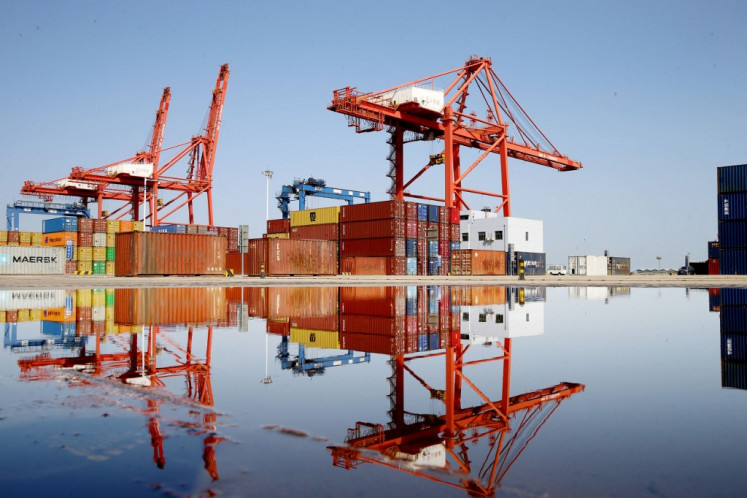BI maintains policy stance, still wary of fuel price, US rate
Bank Indonesia (BI) is maintaining its monetary policy stance, despite accusations from several analysts that the central bank is being dovish and may be keen on cutting interest rates to spur growth
Change text size
Gift Premium Articles
to Anyone

B
ank Indonesia (BI) is maintaining its monetary policy stance, despite accusations from several analysts that the central bank is being dovish and may be keen on cutting interest rates to spur growth.
'If anyone suggests that BI is dovish, I think that's incorrect because there have not been any shift in our monetary stance,' BI Senior Deputy Governor Mirza Adityaswara said in his Jakarta office recently.
Last week, the central bank held its key interest rate unchanged at 7.5 percent for the 10th consecutive meeting, but released a policy statement that was interpreted as dovish, a term denoting a central bank that opts for lower interest rates to spur growth.
In the second quarter, Indonesia's gross domestic product (GDP) growth slowed to 5.1 percent, the lowest level in almost five years, as the economy felt the pinch of BI's monetary tightening, with the central bank hiking its key interest rate by 175 basis points over the course of last year.
- BI's latest statement spent much ink on the sustainability of capital inflows
- BI signaled that the central bank might not deliver a rate-cut very soon
Meanwhile, some analysts are now beginning to price-in a lower BI rate. For instance, Credit Suisse economist Santitarn Sathiratai predicted that BI might cut its interest rate by 50 basis points next year, while Barclays Bank analyst Koon Chow forecast a 25 basis points rate cut to be delivered in the first quarter of 2015.
There seemed to be 'some softening of the statement' recently released by BI, with the central bank likely to take a dovish turn in the near future, wrote Tim Condon, the head of Asian research with Dutch-based ING Group, in an e-mailed note to clients on Friday.
Among the dovish signs, Condon pointed out, were the fact that BI's latest statement spent much ink on the sustainability of capital inflows, while last month the central bank appeared to be more worried about the state of Indonesia's trade deficit.
Mirza, however, signaled that the central bank might not deliver a rate-cut very soon as external challenges remain uncertain while the impact of domestic inflationary pressures from a fuel price hike have been priced in by BI.
'Our monetary policy is designed for the next 12 months, during which we will still be facing issues such as the increase in the US interest rate and the possible rise in fuel prices,' the senior deputy governor said.
A fuel price hike, though it may trigger a one-off inflationary pressure, should be implemented no later than February to safeguard Indonesia against external risks stemming from the upward trend of global interest rates, Mirza suggested.
'A one-time hike of Rp 3,000 [per liter] would be preferable,' he said.
Indonesia suffered the most from talk of tightening US monetary policy last year that triggered a heavy sell-off of rupiah assets, before BI stabilized the situation by lifting the benchmark BI rate to 7.5 percent, the highest level since 2009.
The Fed Funds Rate, a benchmark of interest rates in the US, is expected to be increased next year, which could raise the attractiveness of dollar assets and trigger capital outflows from emerging economies.
The situation might discourage BI from turning dovish, and especially from cutting interest rates, a move which could reduce the returns of investing in rupiah assets and worsen capital outflows from Indonesia, analysts have said. Lower rates here would narrow the gap between interest rates in the US and Indonesia.
'Other than annual adjustment to fuel prices, BI will also have to contemplate the impact on capital flows as the US starts its rate hike cycle,' said Ho Woei Chen, an economist with Singapore-based bank UOB.









